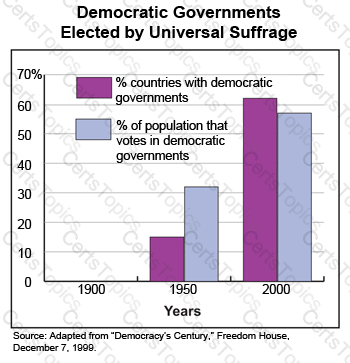-- Exhibit --
The responsibilities of a citizen who lives in a democracy are similar in some ways to those of a citizen in a totalitarian state. For example, a citizen under either system is expected to pay taxes and vote.
However, there are important differences between the two systems. In a democracy, a citizen is expected to respect the rights and opinions of others. The state encourages citizens to become involved in community groups and allows political protest. In a democracy, a citizen has more rights and freedom to carry out his duties. The state exists for the good of the citizen.
In a totalitarian society, the state controls every aspect of human life, and the citizen exists for the good of the state. The primary responsibility of the citizen is to obey and follow. The citizen can vote for only government-approved candidates. The ruling party members or people who support them fill all offices and law-making bodies. Some criticism of the state may be allowed. However, any citizen activity that could interfere with the state, such as a protest march, is outlawed in a totalitarian state
Adapted from Raymond Yuen, publisher, The Way to U.S. Citizenship (Carlsbad, Calif.: Dominie Press, Inc., 1997),116; World Book Encyclopedia, Volume 19 (Chicago: World Book, Inc., 2001), 344.
-- Exhibit --

Which conclusion about citizenship in the world between 1950 and 2000 is best supported by information in the graph?
Which statement about personal finances best represents the views expressed in the passage?
Which is the best example of climate placing limits on human life?
The following text is the Oath of Allegiance taken by a person becoming a naturalized citizen of the United States.
“I hereby declare, on oath, that I absolutely and entirely renounce and abjure all allegiance and fidelity to any foreign prince, potentate, state, or sovereignty of whom or which I have heretofore been a subject or citizen; that I will support and defend the Constitution and laws of the United States of America against all enemies, foreign and domestic; that I will bear true faith and allegiance to the same; that I will bear arms on behalf of the United States when required by thelaw; that I will perform noncombatant service in the Armed Forces of the United States when required by law; that I will perform work of national importance under civilian direction when required by law; and that I take this obligation freely without any mental reservation or purpose of evasion; so help me God.”
Which is an example of a violation of the Oath of Allegiance to the United States?